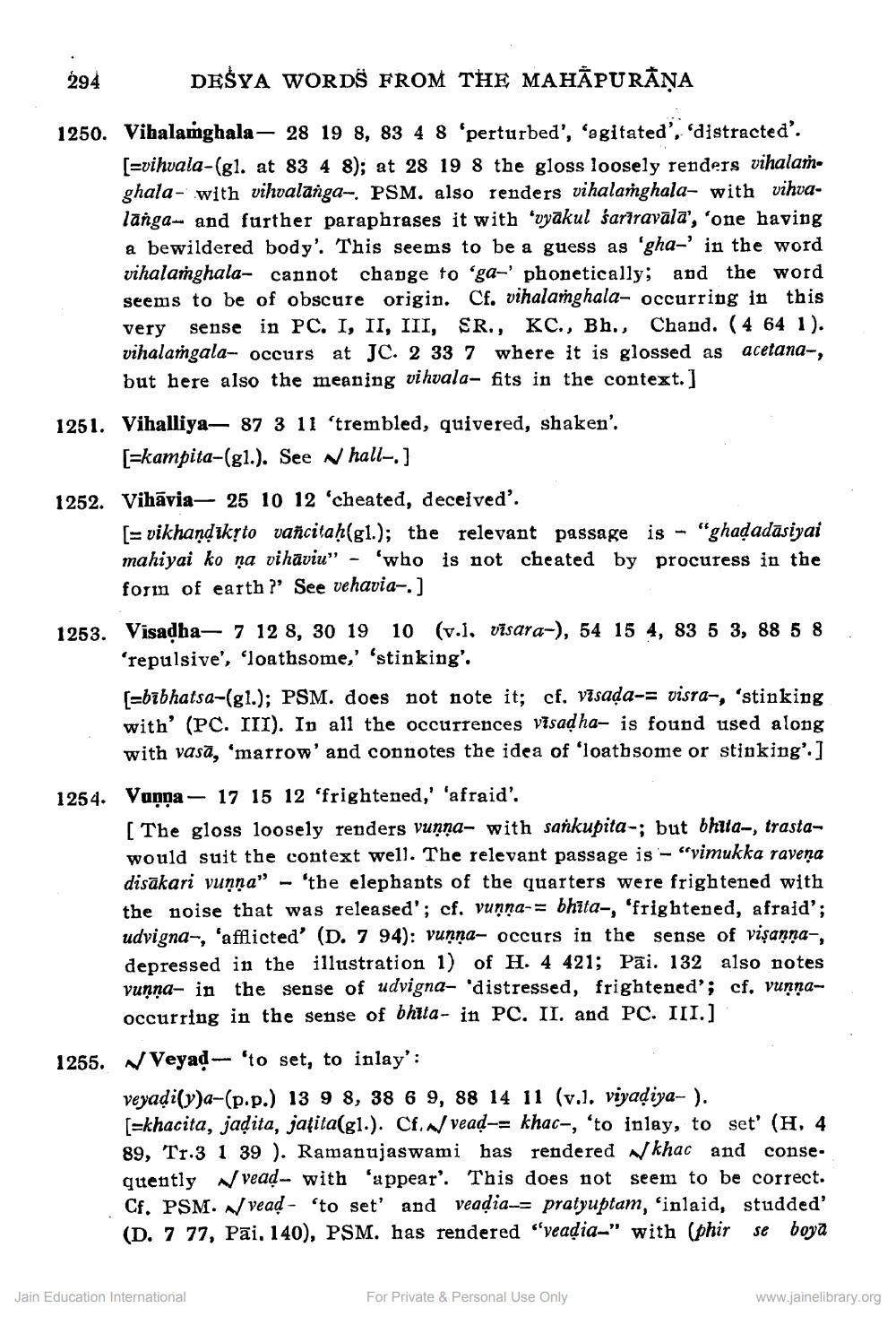________________
294
DEŠYA WORDS FROM THE MAHẤPURĀŅA
1250. Vibalamghala— 28 19 8, 83 4 8 'perturbed', 'agitated', 'distracted'.
[vihvala-(gl. at 83 4 8); at 28 19 8 the gloss loosely renders vihalamghala- with vihvalanga- PSM. also renders vihalasghala- with vihvalanga- and further paraphrases it with 'vyakul sariravāla', 'one having a bewildered body'. This seems to be a guess as 'gha-' in the word vihalanghala- cannot change to 'ga-' phonetically; and the word seems to be of obscure origin. Cf. vihalanghala- occurring in this very sense in PC. I, II, III, SR., KC., Bh., Chand. ( 4 64 1). vihalangala- occurs at JC. 2 33 7 where it is glossed as acetana-, but here also the meaning vihvala- fits in the context. ]
1251. Vihalliya— 87 311 'trembled, quivered, shaken'.
[=kampita-(gl.). See N hall-.]
1252. Vihāvia- 25 10 12 'cheated, deceived'.
[=vikhandiksto vañcitah(gl.); the relevant passage is - "ghadadāsiyai mahiyai ko na vihāviu" - 'who is not cheated by procuress in the form of earth? See vehavia-. )
1253. Visadha— 7 12 8, 30 19 10 (v.1, vīsara-), 54 15 4, 83 5 3, 88 58.
'repulsive', 'loathsome,' 'stinking'.
febbhatsa-(gl.); PSM. does not note it; cf. Visada-= visra-, 'stinking with' (PC. III). In all the occurrences visad ha- is found used along with vasā, 'marrow' and connotes the idea of 'loathsome or stinking'. ]
1254. Vanna - 17 15 12 'frightened,' 'afraid'.
[ The gloss loosely renders vunna- with saňkupita-; but bhiia-, trastawould suit the context well. The relevant passage is - “vimukka ravena disākari vunna" - 'the elephants of the quarters were frightened with the noise that was released'; cf. vunna-= bhita-, 'frightened, afraid': udvigna-, 'afflicted' (D. 7 94): vunna- occurs in the sense of vişanna-, depressed in the illustration 1) of H. 4 421; Pāi. 132 also notes vunna, in the sense of udvigna- 'distressed, frightened'; cf. vunnaoccurring in the sense of bhita- in PC. II. and PC. III.)
1255.
Veyad - 'to set, to inlay': veyadi(y)a-(p.p.) 13 9 8, 38 6 9, 88 14 11 (v.1. viyadiya- ).
khacita, jadita, jațita(gl.). Cf. vead-= khac-, 'to inlay, to set' (H, 4 89, Tr.3 1 39 ). Ramanujaswami has rendered khac and conse. quently vead- with 'appear'. This does not seem to be correct. Cf. PSM. vead - 'to set' and veadia-- pratyuptam, ‘inlaid, studded' (D. 777, Pai, 140), PSM. has rendered "veadia-" with (phir se boya
Jain Education International
For Private & Personal Use Only
www.jainelibrary.org




